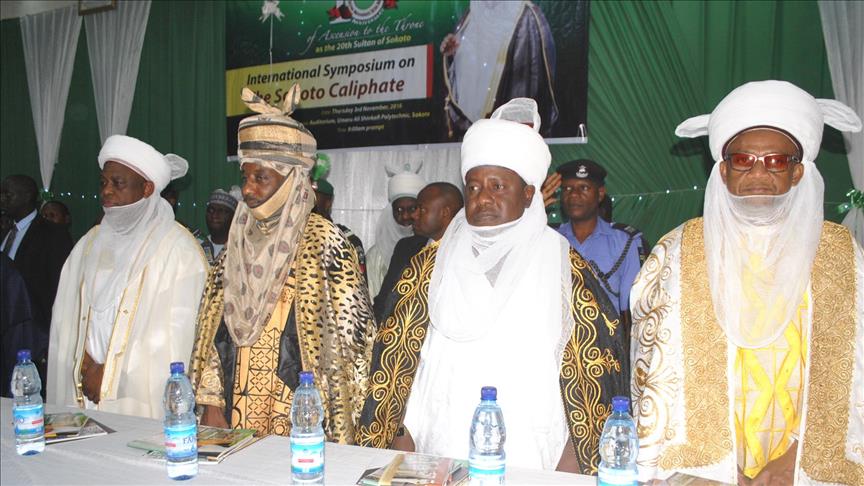
By Rafiu Ajakaye
SOKOTO, Nigeria
When he ascended to the Sultanate of Sokoto a decade ago, many feared Sa’d Abubakar III -- a former army brigadier general -- would lack the political finesse and appeal to make the role a success.
However, 10 years on Abubakar, the 20th sultan of Sokoto in northwest Nigeria, has smoothed relations between Nigeria’s near-100 million Muslims, to whom he is the spiritual head, and the largely southern Christians and has built a reputation as a consensus builder.
“You have led by strong values and you have worked hard to break parochial barriers,” Vice President Yemi Osinbajo, also a Christian pastor, said Thursday as he praised Abubakar’s efforts to build bridges between faiths.
“You have developed deep friendships with... Christian leaders and leaders of all faiths locally and internationally.”
As the sultan said in a speech on Thursday at a symposium held in his honor, he inherited a wide array of challenges -- Muslim-Christian relations were at a particular low with clashes between herdsmen, who are mostly Muslim, and farmers in central Nigeria.
In a bid to resolve these tensions, which were often exploited by political factions, Abubakar travelled the country and abroad giving speeches on brotherhood and religious tolerance while disavowing extremism.
In October last year, he was named among the world’s 50 most influential Muslims.
“[Sultan Abubakar] is actually a peacemaker, a peace builder and this is a traditional ruler and a religious leader par excellence [he] understands relationships, humanity and… is willing to use his office to mend and fix the broken, damaged and dented relationships that Muslims and Christians were having in the past,” Joseph Hayab, spokesman for the Christian Association of Nigeria, told Anadolu Agency.
“I must confess that he is one person I cherish because of his commitment to peace, dialogue and interfaith understanding.”
Abubakar inherited a crisis of confidence between the Muslims in the north and their brethren in the south, especially in the southwest where many Islamic scholars boast large followings.
Muslim divisions
In the years before his coronation, Muslims in the north and south were divided over issues such as the dates of Ramadan. The sultan established a national moon-sighting committee with members drawn from across the Muslim community to unify the date of Eid and bring Nigerian Muslims together.
Observers say he needs to rally Muslim scholars to decide on whether to use the sighting of the moon by the naked eye or to adopt technology to judge the start of holy festivals.
Disu Kamor, executive chairman of the Muslim Public Advocacy Center, said Abubakar “succeeded in building strong and long bridges of understanding and brotherhood.”
However, substantial obstacles remain, not least the religious extremism espoused by group such as Boko Haram.
Abubakar has become an extremely popular figure among all sections of Nigerian society for his willingness to criticize the country’s political class for being “insensitive to the need of the common man” -- a line he repeated Thursday.
His sultanate is built on the historic Sokoto caliphate founded in 1804 by the triumvirate of 19th century Muslim reformer Othman Bin Fodio, his brother Abdullahi and his son Muhammad Bello.
Abubakar, 60, became sultan on the death of his predecessor Muhammadu Maccido in a plane crash. He is addressed as the Ameerul-Mumineen, or leader of the Islamic faith, and is head of Nigeria’s two major Muslim bodies -- the Jama’atu Nasrul Islam, or the society for the support of Islam, and the Nigerian Supreme Council for Islamic Affairs.
He co-chairs the influential traditional council as well as the Nigeria’s Interreligious Council and, under a tradition dating back to his ancestor Bin Fodio, he is also leader of the Qadiriyah sufi order in west Africa.
Abubakar is the son of the 17th sultan, Siddiq Abubakar Dan Othman, and joined the elite Nigerian Defense Academy in 1975 before receiving his commission two years later and serving in the armored corps.
His military career saw him lead the presidential guard and serve in peace missions in Chad and Sierra Leone. He also served as defense attache to Pakistan.
Anadolu Agency website contains only a portion of the news stories offered to subscribers in the AA News Broadcasting System (HAS), and in summarized form. Please contact us for subscription options.

